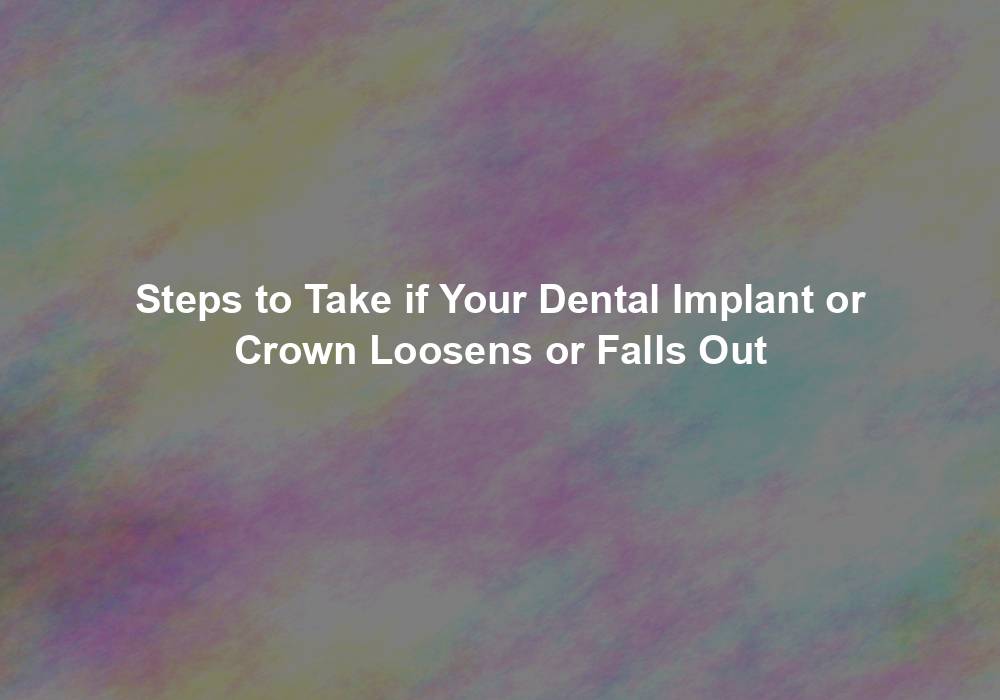Dental implants and crowns are fundamental in restorative dentistry, significantly improving oral functionality and aesthetics. However, they are not immune to issues like loosening or falling out. This article delves into the essential steps to take if you find yourself facing such a dental dilemma, ensuring you handle the situation with care and efficiency.
Understanding Dental Implants and Crowns
Dental implants and crowns serve as replacements for missing or damaged teeth. An implant is a titanium post surgically inserted into the jawbone, acting as a root for the artificial tooth, while a crown is a cap placed over a damaged tooth or an implant. These devices may loosen or fall out due to various reasons, including improper fitting, wear and tear, gum disease, or trauma to the mouth.
Immediate Actions to Take
A. If a Crown Falls Out: Immediately after a crown falls out, it’s crucial to remain calm. Gently pick up the crown, avoiding any damage. Rinse it with lukewarm water and store it in a safe container. Avoid trying to reattach it yourself, as improper fitting can cause further damage.
B. If a Dental Implant Loosens or Falls Out: A loosened or fallen dental implant is a more serious issue and requires immediate attention. Do not attempt to touch or reinsert the implant. If bleeding occurs, apply gentle pressure with sterile gauze.
Read: Can Dental Implants Replace Molar Teeth?
Seeking Professional Help
Contact your dentist as soon as possible. Most dental offices accommodate emergency appointments for such cases. During the visit, the dentist will assess the situation and discuss possible causes. Be prepared to answer questions about your dental history, recent traumas, or changes in your oral hygiene routine.
Temporary Solutions and Care
Before you see a dentist, it’s important to practice good oral hygiene to prevent infection. Rinse your mouth with saline solution or antiseptic mouthwash. If you experience pain, over-the-counter pain relievers can be used, but avoid applying medication directly to the affected area.
Long-Term Solutions and Preventative Measures
The long-term treatment may involve reattaching or replacing the crown or implant. Your dentist will advise the best course of action. To prevent future problems, maintain good oral hygiene, avoid hard foods that can damage dental devices, and schedule regular dental check-ups.
Understanding the Risks and Complications
Ignoring a loose or fallen dental implant or crown can lead to various complications, such as infection, misalignment of surrounding teeth, or bone loss in the jaw. Timely intervention is crucial to avoid these risks.
Conclusion
In conclusion, a loosened or fallen dental implant or crown demands immediate action and professional intervention. Understanding the steps to take in such situations can prevent complications and ensure the longevity of your dental devices. Regular dental check-ups and good oral hygiene are key to maintaining the health and stability of dental implants and crowns.
Read: The Cost of Dental Implants in New Zealand
FAQs
- What should I do if my dental crown falls out but I can’t see a dentist immediately?
If your dental crown falls out and you can’t visit a dentist immediately, keep the crown in a safe place and avoid chewing on the affected side of your mouth. Maintain oral hygiene by gently brushing the area and rinsing with salt water. Avoid using temporary dental adhesive unless recommended by a dentist, as improper application can cause further issues. - Can a loose dental implant cause an infection?
Yes, a loose dental implant can lead to infection if not addressed promptly. The loosening may create spaces where bacteria can accumulate, increasing the risk of infection. If you notice any signs of infection, such as swelling, redness, or pus, seek dental care as soon as possible. - Is it normal for a dental implant or crown to feel slightly loose sometimes?
It’s not normal for a dental implant or crown to feel loose. If you experience any movement or discomfort, it’s important to contact your dentist. Even slight loosening can indicate underlying issues that require professional assessment and treatment. - How can I prevent my dental implant or crown from loosening in the future?
To prevent your dental implant or crown from loosening, practice good oral hygiene, including regular brushing and flossing. Avoid hard or sticky foods that can exert undue pressure on the implant or crown. Also, ensure you attend regular dental check-ups for professional cleaning and monitoring of your dental work. - What are the long-term effects of not addressing a loosened or fallen out dental implant or crown?
Ignoring a loosened or fallen out dental implant or crown can lead to several long-term effects, including misalignment of surrounding teeth, potential loss of jawbone density, increased risk of decay in surrounding teeth, and potential for gum disease. Prompt treatment is essential to prevent these complications.
